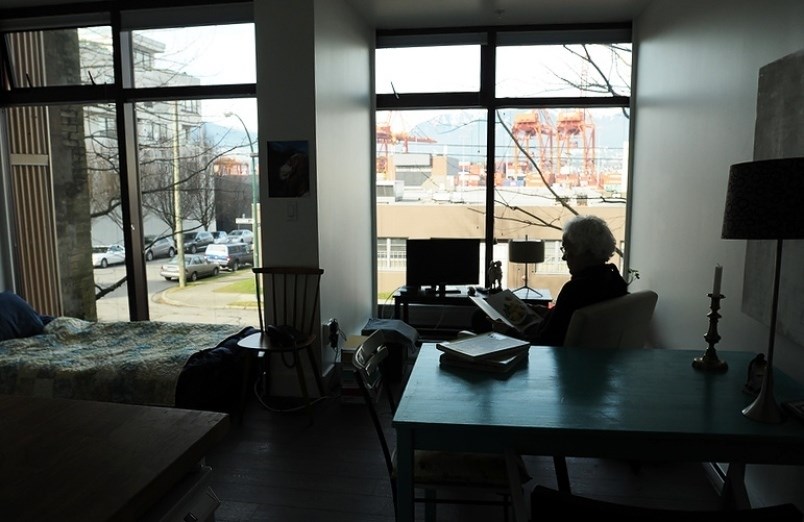In 2017, a Â鶹´«Ă˝Ół»Foundation study on loneliness revealed that 14 per cent of those surveyed found themselves to be lonely often or almost always. Given the situation around coronavirus, it’s a figure that concerns Lidia Kemeny, the director of partnerships at the organization.
“That's a very significant number, especially right now, because that number is going to jump. With 14 per cent of the population saying that they feel lonely often or almost always, that's actually a fair bit to worry about,” she said.
Kemeny, who holds a masters of science in health promotion, with a particular focus on research, has spent most of her working life looking at how to support people to live healthier and happier lives in community.
The 2017 study, built off 2012 research that revealed feelings of social isolation were a serious problem in Metro Vancouver, dug deeper into the issue.
It found that people still felt the same about the strength of their social connections in 2017 as they did in 2012, which disappointed Kemeny because during the five-year period between the studies, Â鶹´«Ă˝Ół»Foundation had been doing “a fair bit of investment into moving the lever.”
The study also discovered Metro Â鶹´«Ă˝Ół»residents were less active in their community than in 2012.
“For the foundation, that’s a huge because participation in community is how we actually improve our collective experience of life in our community,” she said.
“Another top-level finding was that people still prefer connecting in-person to interacting via technology. So, if people are given a choice, in almost every single age category, we found that people actually do want to connect in person.”
Almost everyone also said they wanted to get to know each other better, Kemeny added, and are willing to invest their own time and energy into making that happen.
Which brings us to 2020 and the COVID-19 crisis. There's some good news in the bad news. Although Kemeny would like to replace the term “social distancing" with “physical distancing," from her perspective, the pandemic is prompting people to connect.
“We’re starting to see people actually coming together socially quite nicely and I can imagine that’s going to unfold even more,” she said.
“But we have to watch that we’re not setting people up by saying we’re creating social distances. What we’re doing is asking people to physically distance from each other. We’re not wanting people to socially distance from each other.”
Kemeny expects some populations to be hit hard by what they’re experiencing such as people who aren’t tech savvy or who don’t have the means to be online consistently.
”For them, it’s going to be an especially difficult time, probably feeling more isolated and lonely. I certainly have concerns about that. And, for all of us, things are changing so fast right now. If you think back to a week ago, none of us saw what we’re experiencing today. It changes so fast. We’re not used to, in our communities and in our personal lives, seeing change at the rate at which we’re needing to adapt right now,” she said.
The challenge, according to Kemeny, is finding new ways to connect and to support one another during unprecedented change, which appears likely to continue.
New connections are already happening at a rapid pace online and through social media platforms. Arts and cultural opportunities have emerged, as have Facebook support groups, which have sprung up in almost every neighbourhood.
Kemeny urges people to make connections online even if they haven’t done so in the past, or if they’ve previously questioned the usefulness of online interaction — it can be “nourishing” when people feel scared and isolated.
“Let's pretend, for the time being, whatever ideas and beliefs we had about the relative benefits of those platforms, [to] agree, right now, we need to explore ways of being together that may not have been on the table for us a few weeks or months ago,” she said.
Kemeny added there may also be opportunities for people to volunteer for local organizations, while following physical distancing protocols, and residents can still go on daily walks or outings as long as they keep away from each other.
Despite the crisis, Kemeny remains optimistic about the future because she’s done research about what happens during disasters. Communities tend to create opportunities to support and inspire each other in ways that didn’t happen prior to the disaster.
“I’m actually quite optimistic — and I’m already seeing this happen — that we're going to see people rise and connect to each other in ways that we haven't seen in a very long time. We're going to see humanity in ways that we haven't seen. I believe that people will rise to the challenge,” she said.
“We will look after each other, we will demonstrate resilience and inclusivity… we will see really amazing stories come out of this, of how we can support each other and our communities.”
@naoibh
Read more from the



